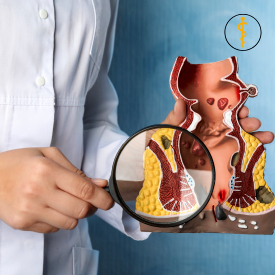Anal Fissures and Fistulas

Anal fissures are small tears or cracks in the lining of the anus, the opening at the end of the digestive tract. These fissures can lead to significant pain and bleeding during and after bowel movements.
Diagnosis is typically based on a physical examination and a discussion of symptoms with a healthcare professional.
Maintaining good bowel habits, including a high-fiber diet and adequate hydration, can help prevent anal fissures.
An anal fistula is an abnormal tunnel-like connection that forms between the anal canal and the skin near the anus. This condition often arises from an infection in anal glands, leading to the formation of a tract or tunnel.
Diagnosis is typically based on a physical examination and a discussion of symptoms with a healthcare professional.
Preventing recurrent anal fistulas involves proper treatment of abscesses, maintaining good anal hygiene, and addressing underlying conditions that may contribute to their development.
If you’re experiencing anal fissures or fistulas, Dr. Mohit Agrawal offers specialized care to address your condition effectively. With extensive expertise in diagnosing and treating these issues, he understands the discomfort and challenges associated with them. Dr. Agrawal provides tailored treatment options, from conservative measures to advanced surgical techniques, ensuring that each patient receives personalized care to promote healing and improve quality of life. Don’t let discomfort hold you back—consult Dr. Mohit Agrawal for compassionate and professional guidance on managing and treating anal fissures and fistulas.
An anal fissure is a small tear or cut in the lining of the anus, usually caused by passing hard stools, chronic constipation, or diarrhea. It leads to pain and bleeding during bowel movements.
An anal fistula is an abnormal tunnel that develops between the anal canal and the skin near the anus. It is often caused by an abscess or infection and can lead to pain, swelling, and discharge.
A doctor performs a physical examination and may recommend tests like anoscopy, sigmoidoscopy, or MRI fistulogram (for fistulas) to confirm the condition and determine its severity.
Initial treatments include dietary changes, topical ointments, stool softeners, and sitz baths. If these don’t work, surgical options like lateral internal sphincterotomy or laser treatment may be recommended.
Treatment options include fistulotomy, seton placement, laser fistula surgery, or advanced procedures like VAAFT (Video-Assisted Anal Fistula Treatment) and LIFT (Ligation of Intersphincteric Fistula Tract).
Surgery is recommended for chronic or severe anal fissures that don’t respond to non-surgical treatments and for fistulas, as they rarely heal on their own and can lead to complications if left untreated.
Laser surgery is a minimally invasive procedure where a laser beam is used to treat fissures or seal off fistula tracts. It causes less pain, minimal bleeding, and allows faster recovery.
A lateral internal sphincterotomy is a surgical procedure where a small part of the anal sphincter muscle is cut to reduce pressure, allowing the fissure to heal and prevent recurrence.
A fistulotomy involves surgically opening the fistula tract to allow it to heal from the inside out. It is effective for superficial or less complex fistulas.
Both surgeries typically take 30 minutes to 1 hour, depending on the complexity of the condition.
Recovery time varies based on the procedure. Most patients resume normal activities within 1-2 weeks, but complete healing may take 4-6 weeks.
Minimally invasive procedures like laser surgery cause less pain than traditional methods. Some discomfort is normal post-surgery but is manageable with medications and care.
Patients should:
1) Maintain a high-fiber diet to prevent constipation
2) Drink plenty of water
3) Avoid straining during bowel movements
4) Follow good hygiene practices
While generally safe, potential risks include:
1) Infection
2) Recurrence of fissures or fistulas
3) Temporary incontinence (rare in sphincterotomy)
The cost depends on the type of surgery and hospital, ranging from ₹40,000 to ₹1,50,000 for fissures and ₹50,000 to ₹2,00,000 for fistulas. Laser treatments are usually on the higher end of the range.
Mumbai offers access to top proctologists and advanced healthcare facilities. The city is known for its skilled surgeons, minimally invasive treatments like laser and VAAFT, and affordable yet high-quality care.
Ready to take the next step towards expert and personalized care for Anal Fissures and Fistulas?
Contact us today to schedule your consultation. Our experienced Anal Fissures and Fistulas team is here to provide expert guidance and ensure your comfort throughout the process.